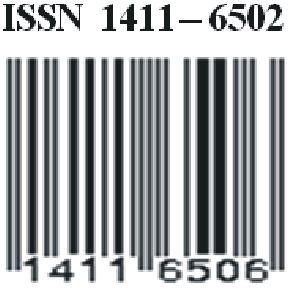Pengembangan Model Pembelajaran Inquiri Dinterferensi Pendekatan Scientific untuk Meningkatkan Keterampilan Berpikir Ilmiah Siswa SMA
(1) Universitas Negeri Makassar
(2) Universitas Negeri Makassar
(*) Corresponding Author
DOI: https://doi.org/10.35580/chemica.v16i1.4583
Abstract
ABSTRAK
Tujuan utama yang ingin dicapai dari penelitian ini adalah menghasilkan buku model pembelajaran Scientific – Inquiri serta perangkat pendukungnya berupa RPP, LKS dan perangkat penilaian yang valid, praktis dan efektif dalam meningkatkan keterampilan berpikir ilmiah siswa. Materi pembelajaran yang dijadikan fokus dalam penelitian ini adalah Larutan elektrolit dan non-elektrolit yang disajikan di kelas X semester genap. Kegiatan menyajikan masalah nyata di Kelas merupakan langkah awal pembelajaran, sehingga diharapkan siswa mampu menganalisis masalah, berhipotesis, mengumpulkan data dan menyimpulkan melalui kegiatan eksperimen. Hal ini tidak terlepas dari kegiatan 5 M (Mengobservasi, Menanya, Menalar, Mencoba dan Mengkomunikasikan) yang merupakan kegiatan-kegiatan berpikir ilmiah siswa. Metode pengembangan yang digunakan adalah Plomp (1997) yang terdiri dari empat tahapan yaitu; 1) pengkajian awal dengan melakukan observasi awal di sekolah mengenai kurikulum, sylaby keadaan siswa serta model pembelajaran yang sesuai; 2) perencanaan draft dari model scientific – inquiry serta materi yang cocok untuk dikembangkan, 3) realisasi & Konstruksi dengan mengembangkan buku model scientific – inquiry beserta perangkat pembelajaran yaitu RPP, LKS dan perangkat penilaian keterampilan berpikir ilmiah siswa sedangkan tahapan 4) implementasi belum dilakukan untuk penelitian tahun I. Hasil uji kevalidan dari tiga orang ahli untuk buku model dan perangkatnya diperoleh masing-masing (buku model = 3,23; RPP = 3,29; LKS = 3,19 dan perangkat assesment = 3,10) total rata-rata 3,20 dengan koefisien indeks judment of expert sama dengan satu kategori valid. Uji kepraktisan model dan perangkat Scientific – Inquiry melalui angket persepsi diperoleh rata-rata 89,47% siswa (dari 32 siswa) yang merespon positif terhadap penerapan model dan perangkatnya dan dari tiga guru kimia di SMAN 1 Bajeng rata-rata 90,05% memberikan respon positif terhadap model dan perangkatnya. Uji keefektifan terlihat dari hasil tes menunjukkan ketuntasan kelas sebesar 81,25% (26 siswa tuntas). Keterlaksanaan pembelajaran dapat dilihat dari observasi aktivitas siswa terkait dengan merumuskan masalah, mengobservasi, bertanya, memberikan argimen, merumuskan hipotesis, mengumpulkan dan menganalisis data, berdiskusi, kerjasama kelompok dan menyimpulkan
rata-rata 75,83%. Berdasarkan dua indikator ini menunjukkan bahwa model dan perangkat ini efektif untuk meningkatkan hasil belajar dan keterampilan berpikir ilmiah.
Kata kunci: Keterampilan berpikir ilmiah, Model scietific-inquiry
ABSTRACT
The main objectives to be achieved from this research is to produce books Scientific learning model - Enquiry and supporting devices such as lesson plans, worksheets and valid assessment tools, practical and effective in improving students' scientific thinking skills. Instructional material used as the focus of this research is the solution of electrolyte and non-electrolyte that is presented in class X semester. Activity presents a real problem in the class is the first step of learning, so it is expected that students are able to analyze problems, hypothesize, collect the data and concluded through experimentation. This is not apart of the activities 5 M (Observe, ask, reasoning, Tried and Communicate) which is the scientific thinking activities of students. The development method used is Plomp (1997), which consists of four stages, namely; 1) The initial assessment by observation early in the school curriculum, the students and the state sylaby appropriate learning model; 2) planning draft of the model scientific - inquiry and materials suitable for development, 3) realization & Construction to develop the book model of scientific - inquiry together with learning devices namely lesson plans, worksheets and assessment tools skills of scientific thinking of students, while stage 4) implementation has not been done for I. year study the validity of test results from three experts to book models and devices obtained by each (book model = 3.23; RPP = 3.29; LKS = 3.19 and assessment tools = 3.10) total mean with a 3.20 average coefficient of expert judment index equal to one category is valid. Test the practicality of the model and the Scientific - Inquiry through perception questionnaires gained an average of 89.47% of students (32 students) who respond positively to the application of models and tools, and of the three chemistry teacher at SMAN 1 Bajeng average of 90.05% giving a positive response to the model and the device. Test the effectiveness evident from the test results show class completeness of 81.25% (26 students completed). Feasibility study can be seen from the observation of student activity associated with formulating problems, observe, ask questions, give argimen, formulate hypotheses, collect and data analyze, discuss, cooperation and conclude group average of 75.83%. Based on these two indicators show that the model and the device is effective to improve learning outcomes and scientific thinking skills.
Keywords: Scientific thinking skills, Scietific model-inquiry
Full Text:
PDFArticle Metrics
Abstract view : 187 times | PDF view : 160 timesRefbacks
- There are currently no refbacks.
ISSN: 2722-8649
Diterbitkan oleh Jurusan Kimia FMIPA Universitas Negeri Makassar (UNM) dua kali dalam setahun yaitu bulan Juni dan Desember.
Alamat Redaksi :Jurusan Kimia, Fakultas MIPA UNM, JL. Dg. Tata Parangtambung, Makassar 90224 Indonesia, Telp. 0411-840295; Fax: 0411840295;E-mail : chemica@unm.ac.id




